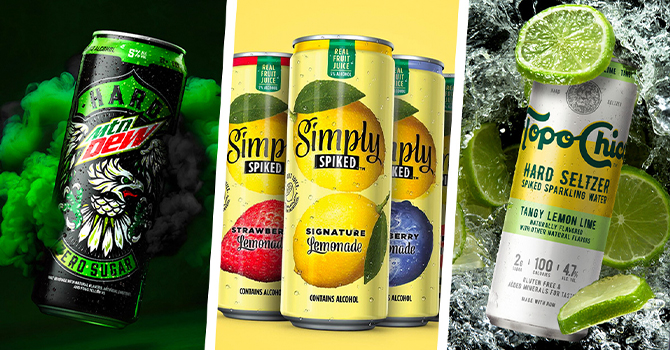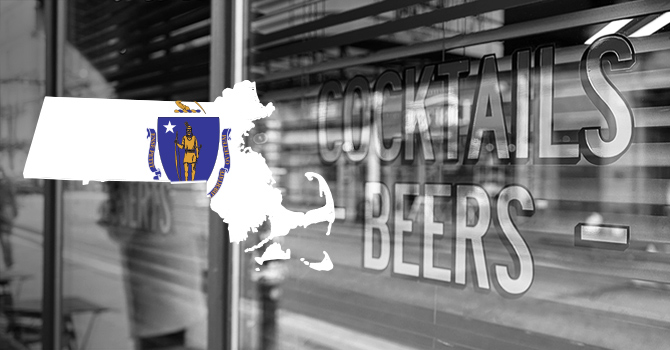
Bev-Alc Crossover Products Must Be Separated in Virginia Retailers
Virginia retailers are now required under law to separate alcoholic versions of non-alcoholic brands from their soft drink counterparts.
Gov. Glenn Youngkin signed H.B. 1979 into law on Wednesday, and it will go into effect on July 1. The law targets fourth category innovations such as Boston Beer’s Hard MTN Dew and Molson Coors’ Simply Spiked and Topo Chico Hard Seltzer.
Beginning July 1, retailers are barred from placing alcoholic products “in an area immediately adjacent to non-alcoholic beverages containing the same or similar brand name, logo, or packaging.”
Furthermore, if stocking Hard MTN Dew, Simply Spiked and similar products, retailers must “equip any such display with signage that indicates the product is an alcoholic beverage, is clearly visible to consumers, and is of sufficient size to notify the consumer that the product contains alcohol,” according to the law.
Past Brewbound coverage can be found here.
Youngkin has yet to sign into law H.B. 2258, which would permit Virginia breweries to self-distribute up to 500 barrels of beer. He has until 11:59 p.m. on March 27 to do so, according to Virginia’s Legislative Information System.

Another 1-Year Extension of Cocktails To-Go Moved to Massachusetts Governor’s Desk
Massachusetts legislators approved a supplemental budget bill Thursday (H.B. 58) that includes the extension of pandemic-era cocktails to-go provisions for another year.
Cocktails to-go allowances are scheduled to expire in the state on April 1. Should the budget bill be approved by Gov. Maura Healey, they’ll be extended to April 1, 2024. Former Gov. Charlie Baker signed a similar 1-year extension in 2022, less than 24 hours before provisions were set to expire.
Since the start of the COVID-19 pandemic, 18 states and Washington, D.C., have enacted laws permanently allowing the sale of cocktails-to-go, while 14 states have enacted temporary laws, according to the Distilled Spirits Council of the United States (DISCUS). Maryland, Tennessee, Vermont and Washington also have temporary allowances set to expire this year.

MIA Beer Unable to Distribute in Florida for 9+ Months as Cavalier Dispute Continues
Doral, Florida-based MIA Beer Company has been unable to distribute beer in its home state for the last nine months as disputes continue with its distributor, Cavalier Beer. Now, MIA owner and CEO Eddie Leon is speaking out on the conflict and calling for a change to state franchise laws.
“Why is MIA Beer no longer available in Florida?” Leon wrote in a post last week on MIA’s social channels. “We’ve been asked this question many times. The reason is that we no longer have a distributor that can deliver our beer in Florida. Why don’t we just find another distributor? That’s where things get complicated. We tried, but can’t.”
MIA has distributed its beers in Florida through Cavalier since 2016 and one year later hit its peak, selling just under 100,000 cases, according to Leon. However, over the next few years, sales began to decline, despite a “beer market at the time [that] was steadily growing in the double digits,” and by the end of 2021, the brewery’s overall beer sales “had dropped to almost 70%” of the brewery’s “2017 high point.”
MIA reportedly requested corrective action from Cavalier, requiring the distributor to develop a plan to address sales within 30 days and to correct any issues within 90 days, The Miami New Times reported. Cavalier allegedly failed to take any action, resulting in MIA sending a notice of termination to the distributor in April 2022.
After that, Cavalier filed a lawsuit against MIA, claiming MIA’s termination is a breach of contract. The distributor also alleged the brewery failed to participate in annual meetings, create its own plan for brand growth or provide Cavalier with sales information to promote products throughout the year, according to the Miami New Times.
“We did everything by the book and were able to terminate, but Cavalier is in denial and sued us,” Leon wrote in an email to Brewbound.
Leon said the brewery’s legal expenses are “skyrocketing.” A trial for Cavalier’s suit is scheduled for December, but “might get bumped into next year,” Leon said. To help with costs, the brewery launched a legal fund campaign on GoFundMe.
Cavalier also filed a motion last year to prevent MIA from signing on with a new distributor while its lawsuit was being evaluated. Although the motion was denied, MIA has not selected a new distributor “for fear of dragging them into the legal fight,” according to a post on GoFundMe campaign page.
“We’re in a complicated situation that’s been created in part by Florida’s beverage laws,” Leon said in the social media post. “These laws give distributors ‘franchise rights’ over their breweries. The laws don’t do this to wineries or distilleries, which operate under regular business contracts. They have ways out of their contracts. We don’t. The laws are written in such a way that makes it virtually impossible for a brewery to leave a distributor in Florida.”
MIA is also promoting Freedom For Beer, a campaign by the Florida Brewers Guild, which aims to update “outdated” Florida law impacting craft breweries. More information on the campaign is available here.

Connecticut Furthers Bill to Drop BAC Legal Limit to 0.05%
Amid rising fatalities for motorists, passengers and pedestrians, Connecticut’s state Legislature has advanced a bill that would decrease the legal limit for blood alcohol content (BAC) from 0.08% to 0.05%.
The bill has been sent to the state Senate. If it becomes law, Connecticut would be just the second state to drop its BAC limit to 0.05% after Utah.
